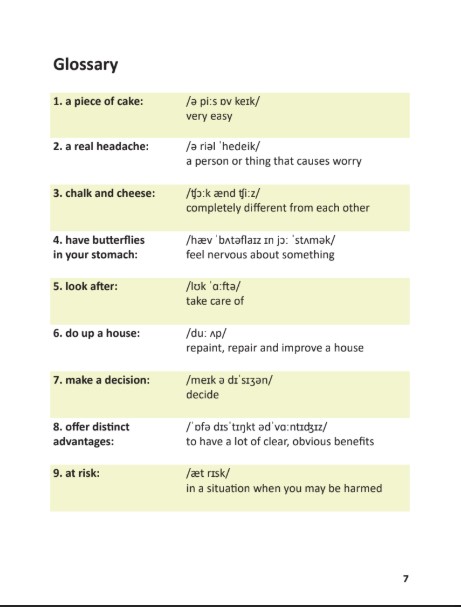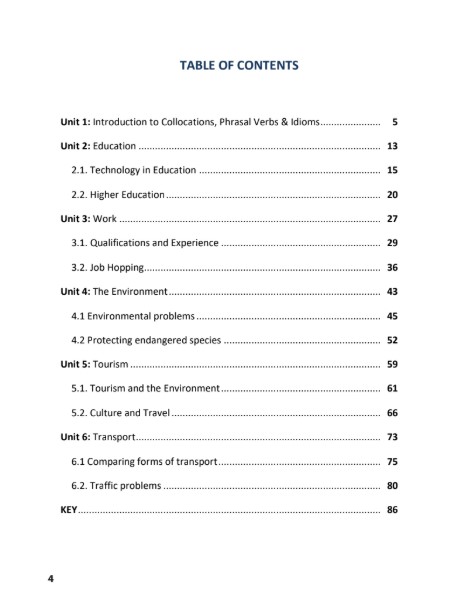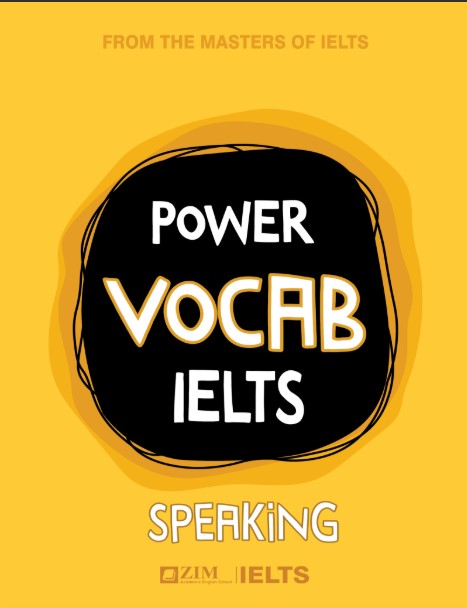


TABLE OF CONTENTS
| Unit | Topic | Page |
| Unit 1: | Introduction to Collocations, Phrasal Verbs & Idioms | 5 |
| Unit 2: | Education | 13 |
| 2.1. Technology in Education | 15 | |
| 2.2. Higher Education | 20 | |
| Unit 3: | Work | 27 |
| 3.1. Qualifications and Experience | 29 | |
| 3.2. Job Hopping | 36 | |
| Unit 4: | The Environment | 43 |
| 4.1 Environmental problems | 45 | |
| 4.2 Protecting endangered species | 52 | |
| Unit 5: | Tourism | 59 |
| 5.1. Tourism and the Environment | 61 | |
| 5.2. Culture and Travel | 66 | |
| Unit 6: | Transport | 73 |
| 6.1 Comparing forms of transport | 75 | |
| 6.2. Traffic problems | 80 | |
| KEY | 86 |
UNIT 1: Introduction to Collocation Phrasal Verbs & Idioms
IELTS test-takers have heard a lot about phrasal verbs, idioms and collocations, and their seemingly ‘miraculous’ power in IELTS Speaking. So what are they? Do they indeed do magic, or are they over-rated? Is learning them a piece of cake or a real headache?
An Idiom is, as defined in the Cambridge Dictionary, “a group of words in a fixed order that have a particular meaning that is different from the meanings of each word on its own.” So like chalk and cheese has nothing to do with chalk and cheese, and there’s nothing flying in your digestive tract when you say I have butterflies in my stomach. Many idioms entail vivid images used as a metaphor for the thing you want to describe.
Phrasal verbs consist of a base verb and two or three more words. The meaning of a phrasal verb is different from the meaning of a base verb. For example, to look after someone doesn’t mean to look at their backs, and to do up a house is, surprisingly, to repair and improve it. We can consider phrasal verbs as similar to idioms, although they are often considered separate concepts in many books for teaching purposes.
A collocation is a combination of words that naturally go together. We make a decision, not ‘do a decision’. ‘Large’ and ‘huge’ are similar in some nuances, but only ‘huge’ collocates, or naturally goes with, the noun ‘advantage’ (a huge advantage). A great combination of a ‘V+Adj+N’ collocation is to offer distinct advantages. The boundary between a collocation and an idiom is loose; in other words, some dictionaries may consider a phrase an idiom, but others see it as a collocation. The phrase at risk is classified as an idiom in Oxford Learner’s Dictionary, but a collocation in Cambridge Dictionary.
Glossary
- a piece of cake: /ə pi:s əv keɪk/ – very easy
- a real headache: /ə riəl ‘hedeik/ – a person or thing that causes worry
- chalk and cheese: /tʃɔ:k ænd tʃi:z/ – completely different from each other
- have butterflies in your stomach: /hæv ‘bʌtəflaiz ɪn jɔ: ‘stʌmək/ – feel nervous about something
- look after: /lʊk ‘ɑ:fta/ – take care of
- do up a house: /du: ^p/ – repaint, repair and improve a house
- make a decision: /meɪk ə dɪ’sɪʒən/ – decide
- offer distinct advantages: /’ɒfə dɪ’stɪŋkt əd’vɑ:ntɪdʒɪz/ – to have a lot of clear, obvious benefits
- at risk: /æt rɪsk/ – in a situation when you may be harmed
Practice
Exercise 1: Label the following photos with the phrases suggesting them.
- ______________ (Image: 1+1=2)
- ______________ (Image: Man looking stressed/worried)
- ______________ (Image: Piece of cheese)
- ______________ (Image: Stomach with butterflies)
Exercise 2: Fill in each blank with ONE word from the Glossary.
- Wild animals are ______________ risk of becoming extinct.
- They are twins, yet surprisingly their personalities are like ______________ and cheese.
- At first I thought the IELTS test was a piece of ______________, but then I ______________________ in my stomach whenever I make a presentation.
- I always have ______________ in my stomach whenever I make a pre-sentation.
- This IELTS book offers distinct ______________ to IELTS learners.
Exercise 3: Complete the following sentences, using the following phrases. You can make some changes to the phrases if necessary.
(Phrases: a piece of cake, look after, do up, offer distinct advantages, at risk, chalk and cheese)
- Our house was built around 10 years ago, and now we need to ______________ a little bit.
- Some of my friends see Maths as ______________________, but I don’t. I almost failed once last semester!
- Tom may be ______________ of losing his job; the boss learned that he had lost a very important folder.
- While fast food indeed ______________________, especially to busy people, I don’t think that it is healthy if over-consumed.
- The previous boss and our current one are like ______________. One is very friendly, and the other is quite aggressive.
- I was on holiday, so I asked my neighbor to ______________ my garden.
Exercise 4: Rewrite the following sentences, using the words you have learned.
- I have decided to take the IELTS test this month.
- My brother is completely different from me.
- Doing Tai-chi is beneficial to old people.
- Before my first interview, I was very nervous because other applicants were more experienced than I was.
- Adapting to a new lifestyle is very difficult to students who are studying in a foreign country.



